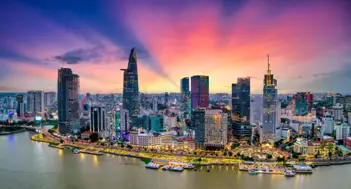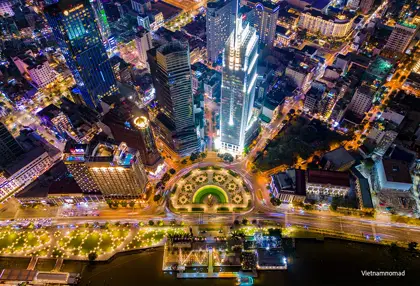Work Permit Vietnam: The Complete 2025 Guide for Talent and Employers
At Aniday, we work closely with global professionals and employers expanding into Vietnam. One of the first questions we hear is: 'How do I legally work in Vietnam?' Navigating permits, visas, and employer obligations can feel overwhelming.
We created this guide to simplify the process. If you are a candidate, you’ll learn whether you qualify for a work permit, what documents are needed, and how to avoid common mistakes. If you’re an employer, we’ll outline compliance rules, hiring timelines, and how to onboard foreign talent smoothly.
What the Vietnam Work Permit Is
A Vietnam work permit is the core authorization that allows most foreign nationals to work legally in Vietnam. It is issued by provincial labor authorities (Departments of Labor, Invalids and Social Affairs – DOLISA) under the Ministry of Labor (MOLISA). In 2025, Decree 219/2025/NĐ-CP streamlined procedures and broadened exemptions compared with prior rules in Decree 152/2020/NĐ-CP and Decree 70/2023/NĐ-CP. S
tandard permits are granted for up to 24 months, generally tied to the underlying employment contract or assignment documentation. Certain foreign workers may instead qualify for a Work Permit Exemption (WPE) in specific cases (e.g., short-term experts, intra-group visitors, or priority‑sector projects) but employers must still notify local authorities before work starts.

Who Qualifies for a Work Permit in Vietnam?
Vietnam classifies foreign workers broadly as: (1) Experts; (2) Managers/Executives; (3) Technicians/Skilled workers; and (4) Certain other categories (e.g., specialists assigned under service contracts or intra‑company transferees).
Each category has documentary criteria (qualifications and experience) that the employer must substantiate in the application. In 2025 the government clarified and expanded exemption categories for priority sectors (e.g., finance, science and technology, innovation, and national digital transformation). A work permit is typically required unless a specific exemption applies; even then, employers must pre‑notify DOLISA within the prescribed timeframe. There is no single nationwide salary threshold; eligibility is demonstrated through role type, qualifications/experience, and compliant labor demand approval.
Application Process Step by Step
1) Confirm labor need / pre‑approval: Employers report their demand for foreign workers to the competent labor authority. Under Decree 219/2025, parts of this step have been merged/streamlined with the permit process in many cases to reduce duplication.
2) Collect documents: Typical items include a legalized/translated criminal background check, health certificate (VN‑standard or duly legalized foreign certificate), degree/professional credentials, proof of experience, a valid passport (full‑page certified copy), photos, and the signed labor contract or assignment letter draft.
3) Submit to DOLISA: The employer (or authorized agent) files the application to the provincial DOLISA with the finalized dossier.
4) Decision & issuance: Processing timelines are commonly around 10–15 working days once a complete file is accepted.
5) Visa/TRC alignment: After issuance, align the employee’s visa status or apply for a temporary residence card (TRC) consistent with the work authorization.
Online portals may be available depending on the province; submissions are often in person or via authorized service providers. Fees are typically borne by the employer.
Processing Times and Validity
Work permits are issued for up to 2 years (24 months), linked to supporting documents such as the labor contract or business license. They may be extended once for up to 2 years; if work continues beyond that, a new work permit application is required. Processing after a complete submission is often around 10–15 working days, though timing varies by province and case complexity.

Employer Responsibilities
Employers must: (a) determine and report foreign labor demand; (b) sponsor and submit accurate documentation; (c) ensure role‑to‑permit consistency (title, location, employer entity); (d) notify authorities about exempt workers before they commence work; (e) track validity and renew/replace permits or exemptions on time; and (f) maintain compliance for inspections (contracts, payroll, insurance where applicable). Decree 219/2025 also introduced clearer renewal and reissuance procedures for exemptions and consolidated steps to shorten processing time.
Common Mistakes and How to Avoid Them
• Mismatched job title or location vs. what’s stated in the permit—keep internal HR data and filings consistent.
• Using outdated document formats—follow the latest DOLISA forms and check if procedures were consolidated under Decree 219/2025 in your province.
• Insufficient legalization/translation of degrees, background checks, or health certificates—ensure proper consular legalization or apostille (where applicable) and certified translations.
• Late filings—submit renewal/extension requests 45–10 days before expiry; plan earlier if moving provinces or changing roles/entities.
• Assuming an exemption means ‘no paperwork’—employers still must notify authorities pre‑start.
• Passport copy errors—Vietnam often requires a certified copy of all pages, including blanks; verify local practice.
Real-World Scenarios
• EU expert for a fintech in Ho Chi Minh City: The employer reports/justifies foreign labor need, compiles the expert’s degree and experience proofs, legalized background check and health certificate, and files with DOLISA. Under Decree 219/2025’s streamlining, the dossier is accepted and the permit issued for 24 months aligned to the contract, then extended once for two more years if the project continues.
• Intra‑company transferee to Hanoi: The parent company assigns a manager with 12+ months of prior employment. If the assignment falls within a clarified exemption category and duration, the employer pre‑notifies DOLISA at least three business days before start; otherwise, a standard permit filing proceeds.
• Short‑term innovation specialist: A specialist entering to advise on Vietnam’s national digital transformation may be exempt from a permit under priority‑sector rules, but the employer must still notify authorities in advance and track time limits precisely.

FAQs
1) How long is a Vietnam work permit valid? - Up to 24 months, generally tied to the contract or assignment; extendable once for up to another 24 months. After that, a new permit is required.
2) How long does processing take? - Commonly 10–15 working days after a complete filing, varying by province and case complexity.
3) What’s the difference between a visa and a work permit? - The work permit authorizes employment; the visa/TRC authorizes stay. Employees usually need both aligned to the same employer and role.
4) Are there exemptions from work permits? - Yes—several categories exist, and 2025 rules expanded exemptions for priority sectors and clarified renewal/reissuance. Employers must still notify DOLISA before work begins.
5) Do applicants need a background check and health certificate? - Yes—Vietnam requires legalized/translated police clearance and a compliant health certificate as part of the dossier.
6) Who pays the government fee? - Fees are typically covered by the employer under local practice and official guidance.
7) Can I change employer or job title after the permit is issued? - Material changes often require reissuance or a new permit; keep title/location/entity consistent with filings.
8) How many times can a work permit be extended? - Once (up to 2 more years). After that, submit a new application.
9) Are short‑term business trips exempt? - Some short‑term activities may fall under exemptions (with strict limits and advance notification). Confirm scope and days worked before relying on an exemption.
10) Is there a national minimum salary for work permits? - No fixed nationwide threshold; eligibility relies on category, qualifications/experience, and role justification, plus compliance with labor and payroll rules.
How Aniday Helps
Whether you’re hiring your first specialist in Ho Chi Minh City or expanding a whole team in Hanoi, Aniday can help you move fast and stay compliant:
• Headhunting & Talent Search – Find vetted experts, managers, and engineers matched to Vietnam’s market.
• EOR / PEO – Hire quickly without setting up a local entity while we manage compliant contracts, work authorization support, payroll, and statutory contributions.
• Global Payroll – Consolidated payslips, benefits administration, and reporting for Vietnam alongside your other markets.
Explore: Headhunting, Employer of Record, PEO, and Payroll.
Conclusion
Securing a work permit in Vietnam is often the key step to building a compliant and sustainable career or workforce. At Aniday, we make the process clearer and safer for both talent and employers—so you can focus on growth instead of red tape.
Aniday's HR Services
Headhunting Service
Find and recruit quality candidates in just 1 week! Supported by 40,000 experienced headhunters in IT, Finance, Marketing… capable of recruiting in any region.
Headhunting Service ➔Employer of Record (EOR) Service
On behalf of your business, we recruit employees and handle payroll without the need to establish a company in markets such as Vietnam, Singapore, Malaysia, India, Indonesia…
Employer of Record (EOR) Service ➔